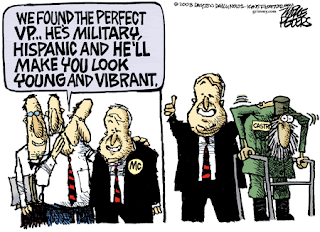In my U.S.-Latin American relations class yesterday, we discussed Fidel’s retirement, and a student asked if this would change the issue of Cuba being on the State Department’s State Sponsored Terrorist list. I remembered that Cuba was on there for harboring members of the FARC, but my student Kelby emailed me about the various other reasons. This isn’t new, but I hadn’t paid much attention to the rationale, which makes for some weird reading.
Nowadays only Iran, North Korea, and Cuba are on the list. Gadaffi is a good guy now, so Libya is off. Sudan is said to be cooperating and so is not a full member of the list anymore either—no, I swear I did not make that up. Genocide, apparently, is not state sponsored terrorism. But I digress.
Here is the State Department link, and check out the very first sentence:
“Cuba continued to publicly oppose the U.S.-led Coalition prosecuting the War on Terror.”
--So Cuba is a state sponsor of terrorism because it speaks out against the U.S. By the way, since when did “War on Terror” become All Capital Letters? Since the Iraq War is part of that, then I suppose much of Western Europe must also be in this category.
Cuba also “maintained close relationships with other state sponsors of terrorism such as Iran.”
--I take it that Russia should also be on the list.
“The Cuban government continued to permit U.S. fugitives to live legally in Cuba and is unlikely to satisfy U.S. extradition requests for terrorists harbored in the country.”
--I guess the U.S. must also be on the list, since we harbor Luis Posada Carriles and refuse to extradite him. Oddly enough, the report mentions him and fails to see the irony. Instead, it uses that case to claim Cuban hypocrisy.
BTW, the report also notes that “Venezuela is the only nation certified as "not fully cooperating" that is not a state sponsor of terrorism.” The next of these terrorist reports will likely be in April. You know many in the Bush administration want to get Chávez on that list. Will they realize that doing so would be so blatantly political that it would likely only help Chávez?
This deserves my very first poll—check out the side bar.
Read more...





